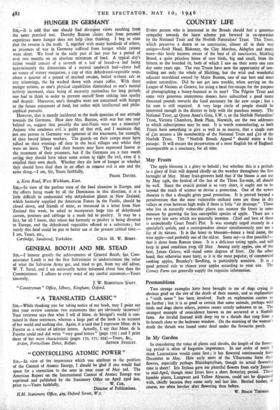Snt,—It is odd that one should find divergent views resulting
from the same practical test. Dorothy Buxton claims that from personal experience mere hunger does not help clear thinking. I beg to state that the reverse is the truth. I, together with many hundreds of others, as prisoners of war in Germany suffered from hunger whilst rations were short. We lived in the early part of last year for a period of. over two months on an absolute minimum of food. A typical day's ration would consist of a seventh of a loaf of bread—a loaf being approximately the dimensions of a normal sandwich loaf—about half an ounce of watery margarine, a cup of thin dehydrated-vegetable soup, about a quarter of a pound of mashed swedes, boiled without salt or any trimmings, the lot washed down with ersatz coffee. With these meagre rations, as one's physical capabilities diminished so one's mental activity increased, since being of necessity motionless for long periods. one had to think in order to prevent oneself from sinking into apathy and despair. Moreover, one's thoughts were not concerned with hunger or the future enjoyment of food, but rather with intellectual and philo- sophical pursuits. However, that is merely incidental to the main question of our attitude. towards the Germans. How dare Mrs. Buxton, with war but one year behind us, suggest that possibly the anti-Nazis were not a minority? Anyone who condones evil is guilty of that evil, and I maintain that not one person in Germany was ignorant of the treatment, for example, of their forced labour workers. The guards on their camps must have talked on their evenings off duty in the local villages and whilst they: were on leave. They and their hearers may have expressed horror at the treatment of their prisoners, but if the Germans are a race worth saving they should have taken some action to right the evil, even if it entailed their own death. Whether they die now of hunger or whether. they should have died then in an effort to remove evil is one and the same thing.—I am, Sir, Yours faithfully, 4, Kent Road, West Wickham, Kent.
FRANK DAVIES.


























 Previous page
Previous page